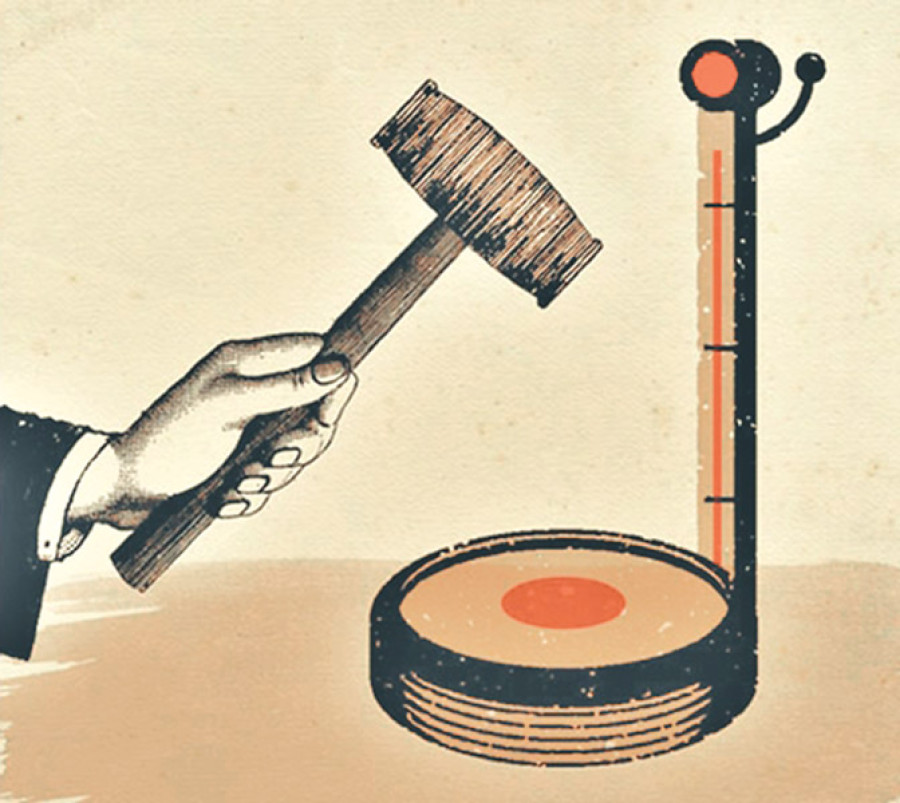Opinion
Running out of patience
Unresolved medical malpractice claims have been piling up due to lack of judges
Kahar Singh Khadka
The hearing date for a medical compensation case, which has long been pending at the Supreme Court, has been deferred for the eighth time. The case began the legal journey at the District Compensation Committee Kathmandu in 2005, and it is still not sure how long the proceedings will last. A hospital patient filed a lawsuit claiming compensation from her doctor and the hospital for medical negligence. She was admitted to the hospital in Kathmandu for the treatment of a small tumour below her right knee. She underwent a surgical operation by an orthopaedic doctor to remove the lump.
Unfortunately, further complications arose after the operation, and the victim had to face an unexpected consequence which was very hard to believe. She had to have her leg amputated. What’s more, her leg was amputated twice, the first time below the knee and again above the knee. She suffered terribly by losing her leg, and now she is desperately waiting for justice.
Diagnostic errors
We regularly come across news reports about relatives of patients launching protests against hospitals for not providing proper treatment. Many times, such incidents, which were suspected to be cases of medical negligence, are not made public and settled privately. This is because health care providers do not want such incidents to be published in the media for fear of losing public credibility. It is also unfortunate that, on many occasions, victims do not declare that they have suffered due to the negligence of medical practitioners. Sometimes, they deal with the situation aggressively. Angry family members of patients have even vandalised hospital property and clashed with the staff.
It will definitely hurt when someone gets harmed unnaturally or a loved one is lost. Everything cannot always be under human control. Sometimes, unpleasant results will appear, even though care providers have skilfully performed their duty to cure the patient. It is normally understood that doctors treat patients to save their lives. That is why doctors are called saviours of human beings. They cannot be liable for all types of harm or injury, and they can be held responsible only when substandard treatment has resulted in injury or damage. Sometimes, a small mistake made by a doctor can be catastrophic for the patient. As a result, the patient undergoes severe physical damage including pain, injury, distress, disfigurement, financial burden and even death.
Researchers at US-based Johns Hopkins have reported in BMJ Quality & Safety that “diagnostic errors are one of the most dangerous and expensive mistakes made by American doctors, estimated to cause between 80,000 and 160,000 deaths every year”. Despite being a developed country where advanced medical equipment is used, diagnostic errors are still commonly noticed in US. What is the situation in an underdeveloped country like Nepal where there is no basic health equipment at many health posts, and where a number of quacks have been arrested? Nobody has the exact data.
Speedy justice
Every citizen has the right to have a standard degree of care and skills while receiving medical treatment.
In Nepal, most people do not know about medical malpractice. And they rarely go to court for legal action. Even in the Kathmandu Valley, very few people have taken legal action against wrongdoers and claimed compensation. Though there is no specific act to regulate and govern medical malpractice in Nepal, there are some legal provisions in the Civil Code and Consumer Protection Act 1998. These provisions are not sufficient, but they can help to make healthcare professionals accountable in case of medical negligence.
Clause 22 of the Consumer Protection Act says that any consumer who suffers a loss or damage of any kind as a result of the sale of any consumer goods or service contrary to the Consumer Act may file a complaint with the Compensation Committee for compensation. Not only that, when medical service providers cause harm to a patient by rendering service in a negligent manner, the victim can begin legal proceedings so that they are punished by a fine or confinement in jail and made to pay compensation.
Our judicial system suffers from lack of judges which has resulted in cases piling up. Recently, vacant judicial positions at the Supreme Court have been filled with new justices, but it is still overloaded with cases, and things have not been speeded up. Besides a backlog of cases related to medical malpractice, there are many other cases which have also been waiting for a final decision. Delays in delivering judgment in time has not only added pain to the innocent party. Victims have to endure hardship, waste of time, economic loss and other undesirable impacts. Justice cannot be established unless it is delivered in a timely manner. So our judicial system should focus on ensuring speedy justice as far as possible.
Khadka is chairperson of Prakriya Nepal, an NGO working in the field of health, education and consumer rights




 19.13°C Kathmandu
19.13°C Kathmandu










